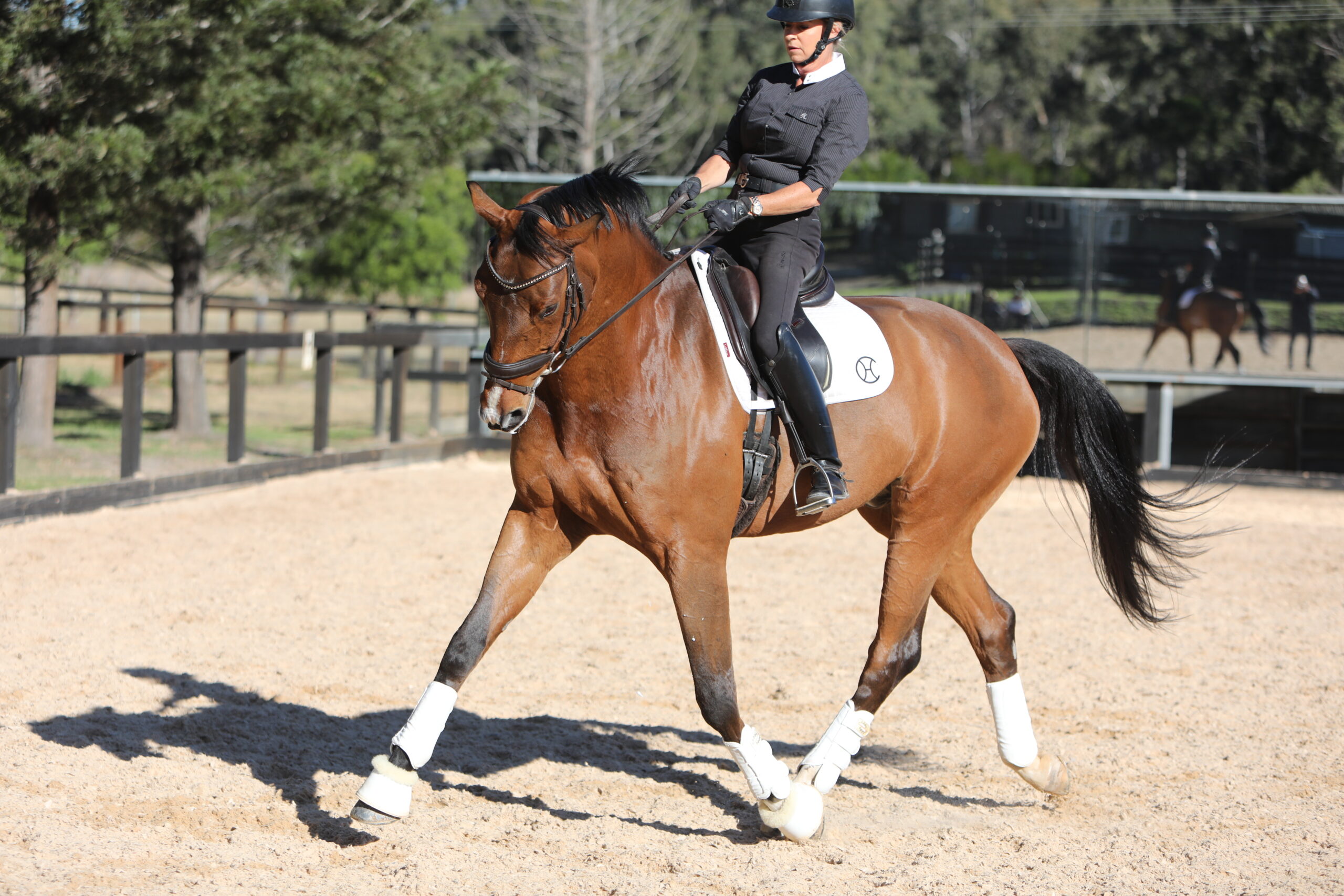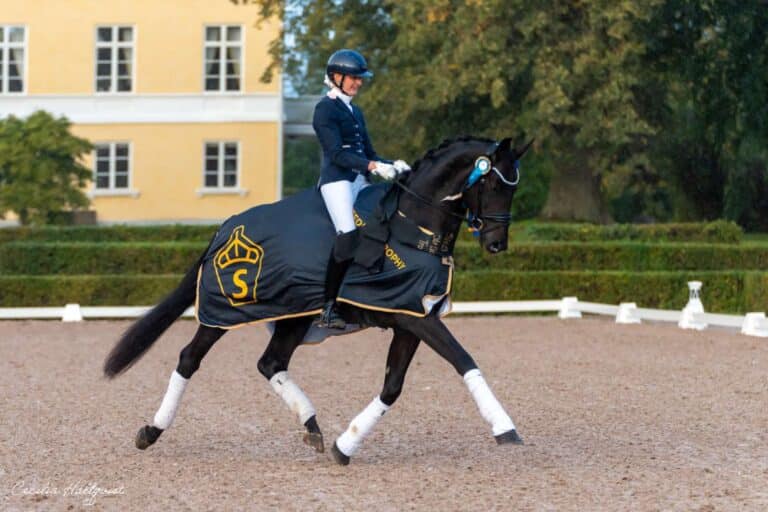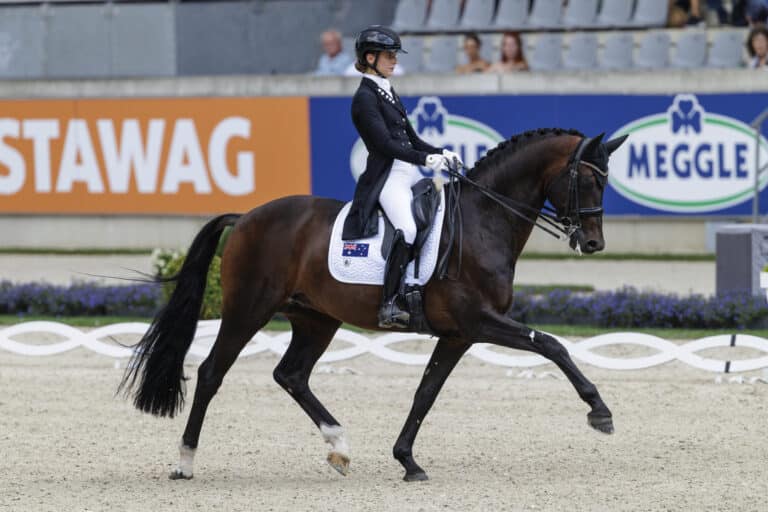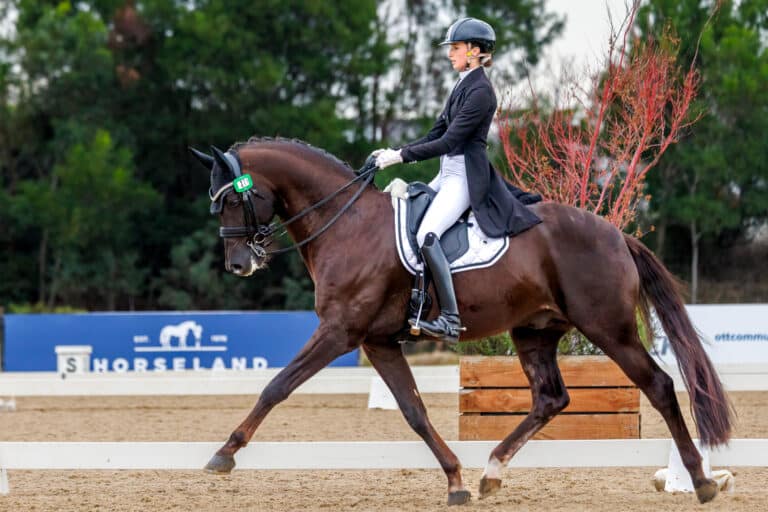By Roger Fitzhardinge
Image by Roger Fitzhardinge.
From a coach’s perspective it is always refreshing to see a student set realistic goals and to flow from one training day to another with an uncomplicated mindset and attitude. When ever you want to make something better there is usually a period of unsteadiness and lack of total confidence after starting on a new project. But it’s about not being afraid to take the challenge and accept that mistakes are the only way to learn. Mistakes in the long run are the crux of improvement. Of course if you never try anything new, you will never go wrong! You will never get in to trouble and you will never make a mistake…. but you will never get anywhere nor will you improve and escalate your experience and understanding.
Poor students always blame some other issue other than their own lack of experience, ability and understanding.
Who’s heard (or used) these?
• My horse never ever does this at home only here!
• My horse won’t blah blah
• My horse is blah blah
• It’s because of the clinic last week where he was upset by having to…….. (probably having to work on the bit!)
• The going is too hard soft deep wet dry powdery coarse
• It’s too windy, too hot, too cold, too dusty, too wet and he hates……
• He is being bad as he doesn’t like being worked in the evening, morning feed time.
• The bit is the problem. He hates the bit.
• He is distracted by the pony in the arena, the umbrella dog cat bird child.
• And…….. He doesn’t like men!!
• He was perfect yesterday
• He never goes like this
Riding and being a good student is about stepping back and looking in. Be realistic and honest with yourself, your riding ability, your experience and do not expect what realistically is not achievable. Its better to achieve smaller goals well, than fail at a huge one. It’s always great to dream and sometimes we are lucky and dreams come true but do not be sitting back saying oh why am I unlucky and can’t get on the Olympic team this – is not going to help.
Remember the natural ability of the horse that you have under you and appreciate the inroads to understanding him. Always be realistic as to where in a competition you think you will finish and simply ride to your best. Think about your horse at all times and take the good and the not so good with an accepting and pleasant attitude. It is simply another day at the office and all doesn’t always go to plan.
Never blame your coach your parent, partner or horse for any bad days. They did not ask you to come to them for help…….. You went to them!! So you must accept that if all isn’t well the problem falls back on your own shoulders. Accept this and deal with it and get about making the next day better. Being a whinger and negative turns people away and no one enjoys this attitude.

Image: Roger Fitzhardinge and his horse, Bloomfield Vision.
A good student realises that competitions come along the path of the training and not to change training methods as a competition is next week. Accept that you are ready or not and realise the situation and if you go to the competition underprepared with a horse that is struggling at home a little it will not be better in the competition arena and so nor will the marks. Good students always are positive towards others who they can learn from, and that is every single rider, trainer and judge whether of a higher or lower standard. There is always a tool that you can take and whether you know how to use it properly or not it is there in the bag for you to further research and practice to use whether today tomorrow or in a year or twos time.
Always have an open mind towards others ideas. Listen and accept their enthusiasm and work out for yourself if it fits your need or not. Good students have the ability to find a good coach and that needs research and is a very personal thing. There must be a rapport and genuine belief in a coach and then the student must be diligent and accepting of the ideas. There are many ways and theories to train a dressage horse, just as there a many languages and when you become proficient in that language you stick with it and communicate with this language. With a horse who is learning the dressage language you need to stick to the one language. It’s the consistency and repetition that produces a good dressage horses with confidence and understanding.
For example, if you are learning French, you will only master the one language if you stay with one language, but if you start with French for a week and then try Japanese for a week then Italian you will be a mess and confused. How would you like to be horse that has the language changed each week! There is no problem to go to a few different trainers who all are training French and get there ideas on French but to be learning French and then go to a Japanese then an Italian for advice on French then that’s going to be a disaster. So decide the language you and your horse will find the most understandable and DO NOT chop and change.
A good student will always be diligent in their attention to the presentation of their own gear and their horses. Whether they are at home and you drop by or at a show, gear will be clean and well fitted, with a well groomed and conditioned horse. It is not just about the riding and the physical attention to rider fitness but to the horse and the impression you impart. It is a sport where first impression and attention to preparation and presentation of horse and rider speaks volumes. Good students turn up for clinics and lessons immaculately presented.
As a student what do I do, to keep bettering my ability to ride a dressage test and train a dressage horse?
The most obvious answer is ride and compete as often as you can so the pressure to perform at your best does not become daunting. To ride and compete should become part and parcel of your daily life and not cause heart racing anxiety and concern. And the way to confirm this so it becomes the norm is as the Nike label says “JUST DO IT”!
Watch other tests and riders who are winning. Talk to judges and respected dressage people and take criticism well, as they won’t be handing out accolades. Take the criticism in a positive light, that it is to help not hinder, but choose mentors that are positive and that are honest and helpful in the overall training scheme and you feel are speaking the same language or you may well get confused not to mention your horse. Again remember if you ask for advice you have to accept what you get as you asked their opinion and they didn’t source you out to tell you what they thought.
Riding a good test is not only the physical riding there is the fitness of the rider as well. Even off the horse there is mental and physical fitness. Mentally you must get your head around every rule in the dressage rule book as it’s the basis of your sport and knowing every rule and definition of every pace and movement will produce understanding and knowledge. This in turn produces confidence and a feeling of knowing your sport and so you can ride at a competition with confidence, that you know what and where you are to be and all the gear and intricate rules that if questioned will not phase you.
Before you ride a test you must be able to perform all the movements at home with ease and understanding. You must know in each movement what the judges will be looking for and where the marks will be weighted. If your horse in a frame or way of going that is not going to get judges to reward your horse then be prepared for the appropriate comments and marks. You still compete but don’t go changing your schooling program, just as there is a competition as the competitions come along at training stages and keep it simple and don’t all of a sudden go changing for the tests sake when it is not conducive to good training and consistency for the horse.
Always get your tests videoed so as you can look realistically at your performance. Look at the future but still ride the test accurately and as well as you can for where you are. It’s always better to compete at a lower level than what you are training, so the horse can enjoy the competing as it’s easy and not so stressful nor hard work for both you and your horse.
What criteria does a good student and competitor use to check on improvement?
I guess the most obvious is percentages, marks and comments and that is for sure a good one to use but keep it in perspective as judges look at different criteria when they judge depending on what they prioritise as the most important facets of training. So if you have a judge who dislikes a frame a little deep or a horse that at moments is behind the vertical then if your horse fits that category at the stage in training you are at, be ready for the lower marks. But that doesn’t mean go out and pull the poll in to the highest point.
To use tests as a criteria for improvement, think, was it easy to ride and did the movements all come up easily? Was my horse adjustable in the arena? Did I feel in control of the frame and the tempo and straightness? Did it feel easy? Without fail I think the best thing to use is video, take emotion out of the equation and then look at the test and be your own critic. If you like what you see then all is good but be realistic and honest if you want to be better.
Always refer back to tests a few months ago and see if the work is looking better. Compare it to a horse that internationally is respected and think, are you heading in the right direction? Sit with your coach and go through the video and realise where you can be better and think of key areas that will help, whether is be better corners and preparation, are the half halts working, is the horse on the bit and through, was it easy to ride in transitions and are my figures accurate and easy.
Who do I look to for help in this challenging sport?
It’s not so tricky. You look to enjoying your time with your partner ..the horse.. Realise it is fun to better your communication and equate the relationship to that with a human friend. No one wants a friend that is not on your side and no one wants a horse or friend who disrespects your opinion. There are ways around disrespect and that is up to the individual sensitivities to the situation and understanding the best approach for the sensitivities and attitudes; and the ways around this are varied and different depending on the characters and emotions of both horse and rider. It’s always the best to have a coach who is honest with you and who appreciates the emotional side to the sport, but if you want to be successful you have to be careful not to let emotion get in the way. It’s about competence creating confidence and emotion is a barrier. Do not let it get in the way.
Riding dressage it’s all about training techniques, the coaching, judging and involvement in all that walks, trots and canters is often totally encompassing. Beware not to let the sport rule your life, especially mentally. It’s a serious sport and one of great dedication but keep it all in perspective and step back and look in and realise where you are in the scheme of things. It will be fraught with highs and lows and ride the waves with modesty and simplicity.
Enjoy your horse and be respectful to all who are involved in the sport as they are all like each one of us. Dedicated, passionate and competitive. Always be congratulatory to all who are successful we all know how hard it is and one day the boot will be on the other foot and there is no better feeling than have others congratulate you.
Enjoy and think of your horse.







